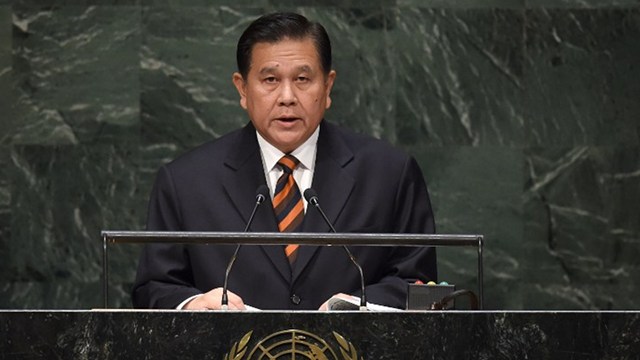SUMMARY
This is AI generated summarization, which may have errors. For context, always refer to the full article.

UNITED NATIONS – “We remain fully committed to democracy and human rights. And we know that we cannot go against the tide of democracy.”
This is the message of junta-ruled Thailand to the international community despite human rights groups’ criticism of its continuing crackdown on rights and freedoms 4 months since the May 22 military coup.
General Tanasak Patimapragorn, deputy prime minister and foreign affairs minister of Thailand, addressed the annual United Nations General Assembly debate at the UN Headquarters in New York where he defended the coup and the actions of the junta.
“Let there be no doubt that Thailand is not retreating from democracy. But we do need time and space to bring about reconciliation, to undertake political reform, and to strengthen our democratic institutions. We do not wish for a repeat of what happened on May 22,” Tanasak said in his speech on Saturday, September 27.
Tanasak said the political impasse between supporters and critics of ousted Thai Prime Minister Thaksin Shinawatra and his sister, former Prime Minister Yingluck Shinawatra, showed that Thailand had a “dysfunctional democracy.”
He said that the military had to grab power from the democratically elected government because the opposing political parties “were unwilling to compromise for the sake of the country.”
“This chain of unfortunate events made the military intervention necessary. We all wished that things did not have to turn out that way. But if the situation was allowed to continue, Thailand’s democracy would have been torn apart,” Tanasak said.
In August, Thailand’s military leader General Prayuth Chan-ocha became prime minister, getting endorsement from revered King Bhumibol Adulyadej. Prayuth has suppressed dissent and prevented protests in the wake of the coup. His hand-picked parliament is largely seen as a rubber-stamp, filled with military officials.
The deputy prime minister said Bangkok is now going through a period of transition, as the junta seeks to implement a “roadmap to democracy” and to restore economic growth. He said democracy is “more than having elections.”
“Thailand needs a real and functioning democracy, one that delivers on the aspirations of the people,” he said.
Tanasak extolled the benefits of democracy, saying Thailand “learned the lesson that democracy is more than having elections.”
“Democracy must be based on respect for the rule of law. And it must be about good governance, transparency, accountability and equal access to justice.”
‘Deteriorating rights environment’
The speech at the UN glossed over human rights violations that the world body itself condemned.
In early September, the UN Human Rights Office for Southeast Asia criticized the “deteriorating environment for human rights defenders” in Thailand.
The office was responding to the cancellation of an event to report the human rights situation in Thailand, made upon the request of the military.
The UN also noted that in August, authorities asked Amnesty International-Thailand to cancel public events to call for the protection of civilians in Gaza. Also that month, police summoned a prominent human rights defender for a defamation complaint that the army filed in response to allegations of torture in southern Thailand.
Human Rights Watch, Amnesty International, and media watchdog Southeast Asian Press Alliance (SEAPA) have decried the treatment of human rights defenders and journalists.
“The junta continues to show contempt for fundamental rights and freedoms. Criticism is prosecuted, political activity is banned, free speech is censored and subjected to punishment, and several hundred people have been arbitrarily detained,” said Brad Adams, Human Rights Watch Asia director. – Rappler.com
Rappler multimedia reporter Ayee Macaraig is a 2014 fellow of the Dag Hammarskjöld Fund for Journalists. She is in New York to cover the UN General Assembly, foreign policy, diplomacy, and world events.
Add a comment
How does this make you feel?
There are no comments yet. Add your comment to start the conversation.